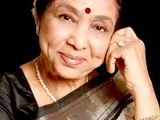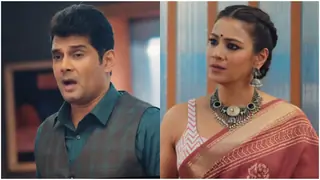Heres an old interview of Asha in Khaleejtimes. its from 2004 April edition. with all the happening here missed posting it. here's it now. i hve one more. let me find it and then will post here.
Her exhaustive repertoire of sounds have mesmerised generations of music lovers, and she shows no sign of slowing down. The venerable Asha Bhosle bares her soul in an interview with Bindu Rai.
How does one describe a legend like Asha Bhosle - a diva who has mesmerised millions with her honeytoned voice and her remarkable talent. From Madhubala to Madhuri Dixit, this ageless singer has been the one link that made glamour girls come alive on the silver screen. With a career spanning over five decades in the Indian music industry, Asha is still forging ahead, breaking new ground in terms of singing and branching out as a gifted business woman with her signature restaurant, Asha's.
Currently in the city for her live concert at the Dubai International Convention Centre (DWTC) tonight, she shared her dreams and aspirations in a candid interview with Weekend.
With over five decades in the Indian film industry,what inspires you to wake-up in the morning and give it your best?
Can a 'pehlwan' (body builder) stop exercising? His muscles will turn to flab. So, you have to wake up in the morning and fine tune your vocal chords.
Since your debut in 1948, there have been a lot of fluctuations in your career graph. What motivated you to keep forging ahead even when the going got tough?
I never look back; I kept moving ahead and stayed with the times. Actually, I have been lucky. I have not had many fluctuations in my career. I have more or less maintained my position all these years.
Many people don't know that your first step into the Bollywood film industry was not playback singing, but in the form of a child artiste. Why didn't you stick with acting as a profession?
Perhaps, I was destined to be a singer. Every time I sing, I am also acting the part of the heroine (through my song) who is going to lip sync the song on the silver screen. This is also a form of acting.
Even though you hail from a family that has a musical dynasty, you were never interested in playback singing during the initial years. What was the necessity to pursue singing as a profession?
Music was my hobby and favourite pastime. I was interested in having my own family, children etc. I never wanted to take up music as a profession. When I had my first son, I wanted to provide him with the best things in life and my husband had a meagre salary. So, I decided to pursue singing professionally, to make some extra money and look where it has taken me. I never expected to gain so much out of it.
Did your family support you in that decision,especially during a time when your sister Lata was already a success story and you knew that road ahead would be anything but easy?
My family has always supported me, whether I made the right decision or the wrong one. They have always stood by me through thick and thin.
It wouldn't have been easy to play second fiddle to your sister and the legendary Geeta Dutt at the time. What was it that kept you going, especially during a time when your own family life was difficult?
I never thought that I was playing second fiddle to anyone, especially Lata didi. In fact Geeta Dutt was a good friend of mine. I had my own individual style as compared to other singers and I was never into the numbers game. I just wanted to do my job and do it well. I was, and still am, a professional singer. It's my duty to do my job to the best of my ability. Each one of us must do our job sincerely and with best intentions, without thinking of the rewards and if you are sincere in your work, then the rewards will follow automatically. I believe in this.
Once you made the conscious decision to walk out of your unhappy marriage and start all over again, did you ever feel demotivated or uncertain about the future ahead? How did you venture forth through the tough times?
You will understand this only if you are a parent. When your child's innocent face looks at you, you want to do anything in your power to keep him happy. I had to do well in my career. I had to succeed. There was no scope for failure. That was my motivation.
People say that OP Nayyar gave you a big break by providing you with the opportunity to sing songs like Yeh Hai Reshmi Zulfon Ka Andhera in 'Mere Sanam' and Aaiye Meherban from the movie 'Howrah Bridge'. Do you agree?
No. I don't agree. OP Nayyar started composing from the mid 50s. I began my career in 1946, at least 10 years earlier. I do agree that I sang some really good songs under his baton, but please remember that if his music made me popular, then my singing and rendition of his songs made all the difference to his career as well. He gave me some of his best songs, but he also gave fabulous songs to Geeta Dutt, Shamshad Begum, etc. I was his main singer because he believed in my abilities.
Even composer SD Burman noticed your talent and groomed you to his style of music. How was the experience working with such a legendary composer?
SD Burman was one of the good composers I worked with, but I preferred his son's music any day. I had the good fortune to work with really outstanding composers like Shanker Jaikishen, Madan Mohan, Salil Chowdhury, Rahul Dev Burman, A R Rehman, Khayyam, Jaidev, etc.
With more work coming your way, how difficult was it to juggle your career and the role of a single parent, especially since you had moved out of your family home and decided to live an independent life?
Where there's a will there's a way. Aren't single parents bringing up their children and carrying on a successful career? There are thousands of women like me who are doing exactly what I did.
Did a rift develop between your sister Lata and yourself? Was it simply a case of sibling rivalry or just hearsay?
People need something to talk about. So, they made this up. Lata is my eldest sister and we live in the same house because we are a joint family. I was always her favourite - even when we were children.
How did it feel when people compare the two of you as singers?
As singers, Lata and me are totally different. We are poles apart even as performers. She's a great singer and I would never have the audacity to compare myself with her. Similarly, she should not be compared with me. We have individually carved our own little places in history and both of us will be remembered fondly. Between us we have more than 20,000 recorded songs. Where in the world will you ever have two sisters with such a record?
How would you rate her as a singer - her plus points and her minuses?
She only has plus points.
During the 70s, after your rift with OP Nayyar, you branched out into a new form of singing - the glam diva who was sensuous and risque - with the credit going to RD Burman. Were you ever nervous experimenting with this style of singing?
This branching out, etc. are figments of a writer's imagination. I was too busy to bother about image change, etc. I was just working hard and very, very busy. In fact, I sung more songs than Lata or Rafi in the 50s, which was Lata's and Rafi's peak period. RD Burman came in the 60s. He brought an exciting style of music and I enjoyed working with him.
Did it matter to you that you were stuck with an image?
The one thing everyone agrees about me is my versatility in music. I can and have sung every type of song possible and in several languages, including English, Russian, Malay, etc. I have sung popular ghazals, classical, western pop, indi pop, love songs, etc.
Did it bother you that even at the peak of your popularity RD Burman didn't give you songs like Raina beeti jaaye or Beeti na jaaye raina?
He did give me Mera Kuch Samaan, Katara Katara, Piya Tu, Dum Maro Dum, O Mere Sona Re Sona, Chura Liya, etc.
After you married RD Burman, you had to face a lot of negative publicity. How did you deal with it?
This is gossip. Rahul and me were most compatible. We had so much in common. Every couple have their little tiffs. It's only natural.
You experimented with ghazal singing for Khayyam in Umrao Jaan. Many feel that it was the turning point of your career.
I have sung some beautiful ghazals for Jaidevji and great qawalis for Roshan. Many are aware of my works with RD Burman, OP Nayyar, Shanker Jaikishen, etc. but in between I also managed to produce a highly successful classical album of my father's songs.
After RD Burman's demise, you continued your playback singing but also entered the third phase of your singing career - your private albums and your remixing. At such at an age you decided to try something new; what motivated you to do that?
I like to work and take on something new and challenging. I never say die.
How was the experience of singing with international artistes like Boy George, Ornette Coleman, Michael Stipe and others?
Very professional. They are interested in your work. They don't want to know what you had for breakfast. I had fun working with them and am at present involved with an interesting project with an American group.
After receiving numerous national and international awards, not to forget the Dadasaheb Phalke award, have the novelty of awards waned in any way?
Audience appreciation of my music is my greatest award. I have never done politicking for awards and whatever I have got has been on merit and on my own steam. I am very happy that I got the Phalke Award.
How does it feel to do playback singing for the present crop of stars and music composers as compared to the earlier ones?
I never differentiate between old and new. As mentioned earlier, I am a professional singer and try to do my job to the best of my abilities. Some songs I like and some I don't, but it is my duty to do my best for each and every song that I am given.
How do you feel about today's remix explosion, with a lot of aspiring singers literally butchering some of your classic hits - and the videos that accompany the songs?
Some remixes are quite good. The videos tend to be vulgar and the visual can change the beauty of the poetry and the original meaning of the song. I wish the directors paid more attention to the lyrics before picturising the songs.
Your glamorous lifestyle has come under a lot of scrutiny over time. How do you deal with this?
I am a trend setter. People tend to emulate my style, both in music, lifestyle and fashion. I am happy that they find me interesting enough and I am particularly happy that today's youth are not hypocrites. They do what they say, unlike some of my contemporaries who prayed during the day and did everything else in the night. They banned Dum Maro Dum from being played on All India Radio and probably heard it furtively in their homes. Today's youth do not have such double standards and they appreciate my frank and outspoken personality. I identify more with them. Sometimes, I am called a youth icon.
What else is left for you to achieve in your life - personal and professional?
Tons of it. Too much to tell you now.
Where do you see yourself 10 years from now, still playback singing or retiring from the profession?
Never thought about it. Never had the time. When I have nothing to do, I shall ponder over this and let you know.
![]()
![]()
![]()
![]()
![]()
![]()
![]()


































